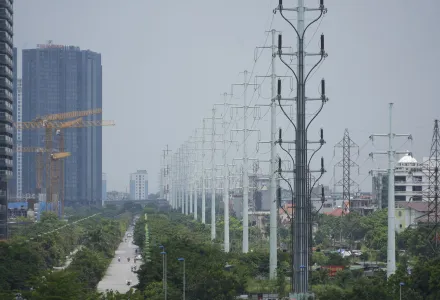Navigating the Grid’s Perfect Storm: Building a Resilient and Reliable Power System
Harvard Project and Enel Foundation Release Paper on Key Issues Facing the Power System in the leadup to COP-30.
Harvard Project and Enel Foundation Release Paper on Key Issues Facing the Power System in the leadup to COP-30.

Renewable-power-generation capacity is growing around the world, due to falling costs for renewable technology, concern about climate change, and an acknowledgement that renewables can contribute to energy security. However, a consensus has emerged that upgrading power grids around the world is key to fully utilizing this growing capacity. This paper is a cutting-edge exploration from a global expert on electricity policy of some of the challenges to building the grid of the future—and some potential paths forward.
The Harvard Project on Climate Agreements is grateful to the Enel Foundation and the Enel Endowment for Environmental Economics at Harvard University for generous support of a series of annual discussion papers on climate-change policy and related topics in energy policy, of which this paper is the thirteenth.
Andy Sun is Professor in Electric Power Systems at MIT’s Sloan School of Management.
The impacts of a changing climate, which include shifts in average temperatures and more frequent, severe weather events, coupled with the rapid integration of variable renewable energy sources, pose unprecedented challenges to the reliability and resiliency of power grids globally. Traditional grid planning and operational paradigms, designed for predictable, centralized fossil fuel-based generation, are increasingly strained by these new realities—compounded by rapid, concentrated load growth from emerging industries like artificial intelligence and data centers—leading to heightened risks of large-scale outages and volatile operational conditions.
This paper addresses these critical issues by first dissecting the evolving nature of power systems and the nuanced definitions of reliability, resiliency, flexibility, and efficiency in this new context. It then analyzes the multifaceted challenges, from physical risks like extreme weather to operational complexities such as declining system inertia and the duck curve.
Drawing upon a multi-disciplinary perspective that synergizes large-scale optimization, advanced control theory, artificial intelligence, power engineering, and economics, this paper discusses a suite of innovative solutions. These include next-generation stochastic and coordinated transmission-distribution planning methodologies; AI-enhanced forecasting and real-time adaptive optimization for grid operations and microgrid coordination; and reformed economic and policy frameworks, such as adaptive capacity markets and proactive regulatory incentives for grid modernization. The objective is to provide actionable insights for utilities, energy professionals, economists, and policymakers on navigating the transition to a resilient, reliable, and sustainable energy future.
Sun, Andy. “Navigating the Grid’s Perfect Storm: Building a Resilient and Reliable Power System.” Discussion Paper ES 2025-13. Cambridge, Mass.: Harvard Project on Climate Agreements, November 2025.